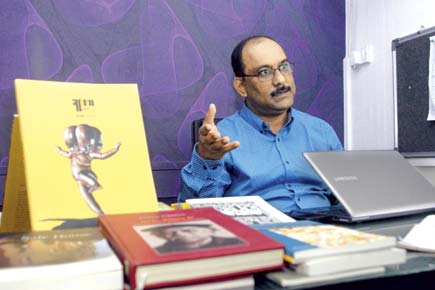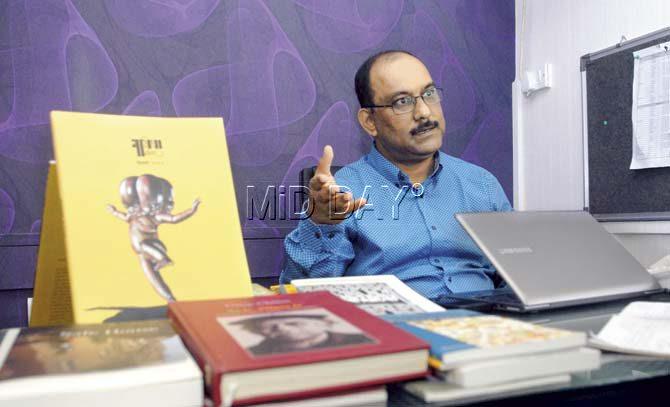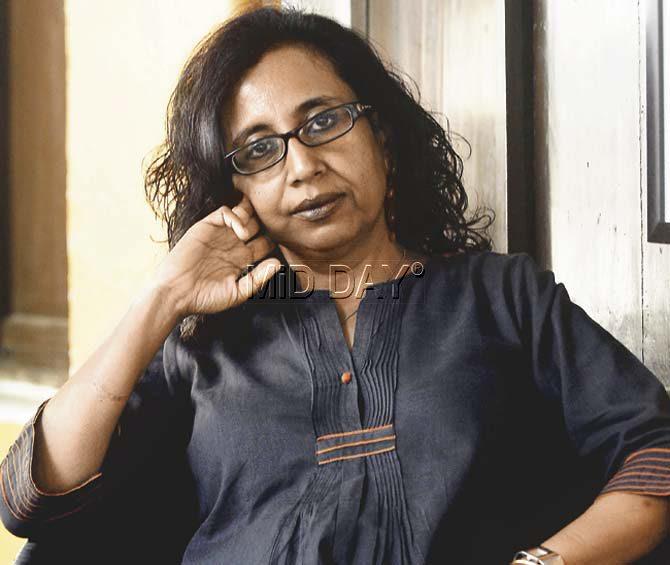An ambitious contest for South Asian writers and poets. An India-China writing collaboration. A poetry festival in Mumbai. Kareena Gianani speaks to small presses founded by writers about ferreting out new talent, challenges, and what a Sahitya Akademi award could mean for their work

They publish titles not to meet sales targets but self-imposed literary standards. Their prized finds are experimental poets and writers, not clones of a bestselling author.

Hemant Divate, who founded the small press, Paperwall, in 2003. Pic/Shadab Khan
ADVERTISEMENT
These ideas are why writer Sharmishtha Mohanty started Almost Island, a publishing house she founded as an online literary journal in 2006, before publishing books in 2011. Mohanty is selective to an extent that she follows a poet/writer’s work closely for a year before approaching him/her all very unlike larger publishing houses.

Sharmishtha Mohanty, founder of Almost Island. Pic/Suresh KK
Till date, Almost Island has published only three books Trying to Say Goodbye (poetry) by Adil Jussawalla, Five Movements in Praise (prose) by Mohanty and Magadh (poetry) by Shrikant Verma. “I started Almost Island to publish deep, literary voices from within India and abroad. I wanted to showcase serious writing that wasn’t in the public eye,” she says.
Last month, when poet Adil Jussawalla won the Sahitya Akademi award for Trying To Say Goodbye, the victory was in the vanguard of publishing when it came to Mumbai’s small presses — Jussawalla’s his poetry has never been published by a major publishing house.
“This is not just a prize given to a poet, but to a small press which has been selective. It is their stand which has been vindicated and I hope the recognition further helps Almost Island get noticed for their various endeavours, not just publishing,” he says.
The attitude of small presses such as Almost Island, adds Jusswalla, is reminiscent of Clearing House. Vexed at their numerous unpublished manuscripts, Jussawalla, Arun Kolatkar, Arvind Krishna Mehrotra and Gieve Patel established the poets’ collective in 1974 and went on to publish some of the most seminal works of Indian poets in English.
“Small presses try hard to find distributors and personally lug copies to booksellers in different cities you have to be committed to the literature you want to see published to be able to do all of this,” he adds.
No small task
Mohanty would know. She is realistic about just how much the award will change things for her endeavours. The award is surely an encouragement and one which is good for independent voices, but she says she would have continued doing what she does in any case. “I don’t think the publishing scene in India has changed much over the years, except for the fact there are one or two small presses now” she says.
She dismisses the popular notion that publishing poetry is expensive. All their three books, she says, have good covers and sleek design. “If we throw up our hands saying poetry is an expensive proposition, it simply means we aren’t trying hard enough,” she adds.
Finding and sustaining new talent
This doesn’t mean small presses such as hers face few challenges. Distribution is difficult and finding and retaining new talent is an exacting process. Almost Island has just announced an ambitious contest for South Asian writers of prose and poetry and cross-genre works, whose winners will published.
“We are looking for newer, bolder voices,” says Mohanty. Almost Island has also tied up with Small Press Distribution, a US-based non-profit organisation which works with independent publishers and prints their titles internationally. Snehal Vadher is one of the new, young poets who have benefitted from a small press’s efforts. His work was picked up by Almost Island in 2012.
“For a new poet, it is impossible to walk up to a publisher and get published, but that happened when I approached Almost Island at a book reading. My poetry is not mainstream, and it is easy to fall into the trap of writing what sells. Small presses introduce poets to new communities and it is a relationship worth having,” says Vadher.
Hemant Divate, an advertising professional by day and a Marathi poet at heart, started Paperwall in 1992 when he launched his literary journal, Abhida. Back then, he identified himself as a ‘post-Satyakatha poet’ (Satyakatha was a renowned poetry magazine, known for its romantic and mainstream content). In 1999, he changed his stance in the form of Abhida Nantar and began encouraging poets who wrote on matters of the post-globalised world.
Paperwall continues publishing Marathi and English poetry and translations from Marathi, even Oriya. Abhida Nantar’s recent issue features people whom Divate calls the ‘Facebook Poets’, poets who self-publish online. His largest concern today, after almost two decades of running a small press, is about finding and sustaining avant garde poets. “I wonder whether I would have been able to do this if I didn’t have a day job.
Bookstores such as Crossword rarely stock poetry, and when they do, it is mainly Gulzar and Javed Akhtar’s. Flipkart seemed to be a saviour of sorts first, but they then branched out into electronics. Paperwall’s Marathi arm is doing well because we have a dedicated reader base, but the challenge now is to find and tap newer readers for English poetry,” he says.
Divate hit upon a solution of sorts in September 2013 he organised Mumbai’s first poetry festival, Poetrywala, and was pleasantly surprised at the people who turned up. “There were 150 people at every session held at the JJ School of Arts, and we sold 34,000 copies of Paperwall’s English poetry. That had never happened in 20 years,” he says.
Plans ahead
This year, Divate will publish four new Marathi poets and two in English. Almost Island is working on a book which will be a dialogue between Indian and Chinese writers.
This was born from an India-China writers dialogue held by Almost Island in 2009, 2010, and 2011. It was the first non-official writers conversation between India and China. One of the poets, Ouyang Jinaghe, for example, went back and wrote a 600 line poem on the Taj Mahal.
 Subscribe today by clicking the link and stay updated with the latest news!" Click here!
Subscribe today by clicking the link and stay updated with the latest news!" Click here!







